(Un)arranged Marriage Read online
Page 15
‘Yes, of course I will.’ I wiped yet more sweat away from my forehead and felt a fly come away onto my hand: one thing that I was definitely not going to miss.
‘Will you send me some photos, the ones that you have taken with your camera?’
‘Yes, Uncle-ji, I promise.’
‘Good. Good. I do not have any photographs of my family,’ he said.
I remembered going to the open courtyard and two-roomed shack that his family lived in. I had taken photos of his wife, Naseebo, and their kids, and some of his own father, who was bent over with old age and had wispy tufts of white hair growing in patches on his head, his eyes clouded over with cataracts like smudged grey chalk on a blackboard. They had all stood to attention when I took the pictures, really formal poses and serious faces. Uncle Jag told me that they posed like that because they saw having a photograph taken as something important and that they were trying to make a good impression on anyone in England who might see them. Apparently they thought that those stiff, formal poses were what were expected.
‘We have never had a camera in our family,’ said Mohan, Breaking my thoughts. ‘We are just poor people.’
He spoke with an air of resignation. It wasn’t like he was trying to make me feel sorry for him, so that I would give him something. He said it in a matter of fact way as if he believed that he could never change anything. I had already decided to leave him my camera and the couple of rolls of film that I hadn’t used up. I mean, it was no skin to me – the camera wasn’t even mine. And to tell you the truth, being in India had made me think about all the things that I took for granted. I looked down at my mashed-up trainers and decided that I was lucky to have them at all, never mind the ability to buy a new pair if I wanted to. Most people in India had nothing. They wore the same clothes until they fell off and made do with basic food, basic everything. In Adumpur there were a few rich families, with cars and big houses – stuff bought with money that their fathers and grandfathers had earned in England and America and Dubai and Saudi Arabia. But most of the people were poor. I could get another camera anytime I wanted. The camera meant ten times as much in Mohan’s world as it did in mine. That was one of the best lessons I took from my time in India. Making relative comparisons, Uncle Jag had called it.
I looked down at my trainers again and then over to Mohan and the cracked brown leather slip-ons that he always wore, with no socks, the dust caked to his ankles, and the feeling of guilt started up again. Were trainers really so important?
Mohan must have read my mind because he put his hand on my shoulder and laughed. ‘Do not worry, Manny. It is the way of the world that some people have money and most people do not. How would the world work otherwise?’
Uncle Jag sat discussing land prices with Uncle Gurvinder on the veranda later that evening. I watched him from the yard where my cousins – Inderjit, Jasbir and his brother Onkar – were working on the engine of the family tractor. Onkar had stripped it down and was in the process of cleaning the parts and oiling them, describing to us exactly which part performed which task and where it went. Inderjit and Jasbir were engrossed in it all but my mind was elsewhere, dreaming about the trip to Delhi and about how it would feel to finally get off the plane back in England. Cousin Avtar’s daughters, Sukhit and Manpreet, broke my thoughts. Manpreet had a stick in her hand and was poking a new water buffalo calf with it. The calf was trying to back away but its path was blocked by the size and weight of its mother. As Manpreet teased and prodded the calf, its skinny legs gave way and it toppled forward. Manpreet squealed with delight at her game and her elder sister, Sukhjit, decided to join in. Manpreet then turned the stick on her sister, to the obvious relief of the calf which pulled its chain around and as far underneath its mother’s flank as possible. The cow, its head in the water trough, didn’t even notice. A sharp slapping sound made the cow look up and then screaming and crying took over. Sukhjit had knocked Manpreet over.
I walked over to Manpreet and held out my arms. She stood crying for about thirty seconds, looking around to see if anyone else would come to her aid, before realizing that I was her only choice. I picked her up and went over to the veranda, handing Manpreet to her mum, Jaswant. She smiled without saying a word and then looked away.
‘Did your uncle-ji hit you, Manpreet?’ asked Aunt Harpal, who was sitting next to Jaswant. I started to defend myself before realizing that my aunt was teasing me. ‘I hear that you are going to make paratha for us one morning?’ she continued, looking highly amused.
‘Huh? Paratha?’ I said. I didn’t have a clue what she was on about. Paratha are like double chapatis filled with potatoes or herbs and spices.
‘Yes he is,’ said Uncle Jag from behind me. I turned around and gave him a questioning look before asking him in English what he was on about. Rather than explain, he just smiled and winked at me before continuing in Punjabi to Aunt Harpal. ‘He wanted me to show him how to make them so that he could say thank you for looking after him.’
I glared at my uncle who just carried on smiling.
‘And you know how to make paratha?’ asked Aunt Harpal, mocking my uncle.
‘When you spent so much time living by yourself, you have to learn these things,’ he replied, smiling.
‘If you had married a nice Punjabi girl, Jagtar, then maybe you would have had someone to make these things for you, yes?’
Uncle Jag’s smile wavered a little bit but he kept his cool. He turned to me and gestured with a hand. ‘Maybe Manjit here can make paratha for his wife.’
I shot a look at my uncle, the kind that asked what he was playing at, calling me ‘Manjit’ and talking about some wife who he knew I didn’t want.
‘Imagine that,’ laughed Aunt Harpal, ‘a Punjabi man making food for his wife. How can that be?’
I looked at Uncle Jag again. I wanted an explanation.
‘Don’t worry, Manny,’ he explained in English. ‘Paratha are part of the master plan.’
‘What? How can a few chapatis be a part of the plan? What am I going to do? Fly home on one?’
‘Look at you two goreh,’ laughed my aunt. ‘Speaking in your foreign language so that I cannot understand you.’
‘Let me show him how to make paratha and then you will understand,’ replied Uncle Jag before winking at me and telling me that he would explain it all later.
I gave both of them an odd look and walked back towards Onkar’s master class in tractor-engine cleaning.
Everyone else had gone to bed by the time that I went up on to the roof with Uncle Jag and Inderjit. It was pitch black and there was a cool breeze blowing across the fields and over the village rooftops. I had become used to the darkness at night; the village had no street lights or neon signs for takeaway kebabs and burgers, not like in Leicester.
‘Tomorrow I need you to pick something up for me,’ Jag said in English, which meant that Inderjit was not supposed to understand what we were talking about.
‘Pick up what?’ I asked.
Inderjit was standing next to me. ‘What are you talking about?’ he asked in Punjabi, wanting the loop to extend so that it included him.
‘Inderjit, he can’t understand Punjabi in the same way that you can. Sometimes I have to explain things to the gorah in English,’ said Uncle Jag, bringing a knowing smile to Inderjit’s face. As far as he was concerned he had one up on me now.
‘So clever, these goreh,’ he said, mocking me. ‘What do they really know, heh, Uncle-ji?’
‘Yes, that’s right,’ assured Uncle Jag in Punjabi. And then to me in English. ‘Something from Mohan. In the haveli after he has finished in the fields.’
‘What am I picking up?’
‘Don’t worry about that. Just do what Mohan tells you,’ he said, dismissing my curiosity.
‘Where are you going to be?’
‘Jullundur. Picking something up.’
‘Why can’t I come with you?’ I asked.
Uncle Jag shook his head. ‘I need you t
o be here,’ he said.
‘Why?’
‘You ask too many questions for a real Punjabi man,’ he said, imitating my old man. ‘Listen, I’ll tell you all about it, I promise. For now just do me these two favours. Pick up the package from Mohan and then get together everything that you want to take back to England with you. And don’t let anyone see you get your things together. Not even the kids.’
That killed my further questions. Dead. I beamed at him, pure Cheshire Cat style. Ear to ear. My head started to spin and my heartbeat was pounding out a drum and bass tune. We were going to do it. Really going to do it. Get the hell out of Adumpur and India.
‘Now let’s get downstairs,’ said Uncle Jag, in Punjabi for Inderjit.
I followed Inderjit down the stairs, smiling all the way and fell asleep clicking my heels together. I mean, there really is no place like the one that you call home.
CHAPTER TWENTY-FIVE
September
I SAT IN the haveli the following afternoon, waiting for Mohan to come in from the fields with his mysterious package. The rain had come down in sheets during the morning, stopping just after midday and it was now really hot and humid. The heat of the sun had dried out the dirt tracks and dusty yards by the time I had walked the short distance to the haveli with a bottle of cola and my camera.
I’d managed to get all my things together without anyone seeing me, packing my clothes tightly into my backpack and leaving some of the stuff I wasn’t taking back with me, like T-shirts and a few pairs of shorts, lying around in the room where I’d been sleeping. My notebooks were also packed, but my personal stereo was too far gone to take. It would make a good decoy. I left it lying on the manjah that I had been using as a bed along with a few cassettes, their tape warped by the heat. The stereo had been a kind of lifeline during my first few weeks in India, drowning out my new surroundings and keeping me in touch with my real life. On the return trip I was going to be way too hyped to want to block it all out. I was going to savour it all – the trip to Delhi, the plane journey, the train or bus back to Leicester. Back to life, back to reality – like that Soul II Soul tune.
I’d been waiting for about an hour when Mohan rode into the yard on Inderjit’s rusty bike, a cloth bag strapped across his back.
‘Here is your little present,’ he said, parking his bike and handing me a brown paper package about the size of two matchboxes stuck together. I got up off the hammock and took it from him, turning it over in my hands. What was it? Mohan was shaking his head at me. ‘Do not even ask me, Manny. I cannot tell you or I will lose the only friend that I have in your family.’
‘I’m your friend too,’ I said, suddenly feeling as though I had to prove myself to him. I suppose I didn’t want him to lump me in with the rest of my family. In my mind I was as much of an outsider as Uncle Jag. My family just didn’t know it yet. I turned to the hammock and picked up my camera, my own little present for Mohan. ‘Here. This is for you.’
Mohan looked at the camera and the two spare rolls of film that I pulled out of my pocket and shook his head. ‘No, Manny-ji, no. This does not make our friendship.’
‘It’s not about that,’ I answered defensively. ‘I want you to have it.’
‘But I don’t know about these things,’ he said, gesturing at the camera. His eyes were fixed on mine.
‘That’s not a problem, Uncle-ji.’ It was only the second time that I had addressed him in that way, using ‘uncle-ji’. Because he was from a lower caste than me, by tradition, I wasn’t supposed to be as respectful towards him as I was with members of the same caste. I think that the combination of my present and my unintentional show of respect was what caused Mohan’s eyes to fill with tears.
‘Manny, I do not know what to say.’
‘You don’t have to say anything. It’s yours. For all of the kindness you have shown me.’
‘Beteh, you are truly your uncle’s twin,’ he said, touching the camera to his chest, over his heart. ‘Here, Whereit counts.’
I suddenly felt kind of embarrassed because I wasn’t used to displays of emotion like that. I had to change the subject. ‘I’ll show you how it works.’
‘Thank you, Manny,’ replied Mohan, wiping his eyes and then giving me a hug. ‘Give the package to your uncle when he returns from Jullundur.’
‘Have you finished all your work for today? Out in the fields?’
‘Yes. I was about to go home. I have a few more things to organize for you and your uncle.’
‘Good,’ I said, smiling. ‘I’ll come with you and show you how to use the camera. So that you can have pictures of your family to show me. Next time I come to Adumpur.’
Mohan thought for a moment, his forehead creasing. ‘And they won’t mind, your family, if you leave such an expensive thing with this old monkey?’
I laughed at him and punched him on the arm. ‘Uncle-ji, if anyone was born to have tails, it is my family. Not you and yours.’
That seemed to kill any doubts that Mohan had about accepting my gift because he chuckled to himself all the way back to his house.
Uncle Jag beamed at me when I handed him my package later that evening. He studied it for a moment and then tucked it into his shirt pocket. We were standing in the haveli yard, by one of the storage rooms. I was tempted to ask him about the contents of the package but he cut my questions dead by handing me a large grey hessian sack.
‘Here, take this,’ he said in English.
I held the sack open and looked inside. It smelt damp and musty. ‘What’s it for?’
‘It’s for your things. Anything that you are taking back with you,’ he replied.
My stomach flipped over with nerves and excitement and I wondered if this was what it felt like just before taking the final kick in a penalty shoot-out – half of your brain about to explode with excitement and the other half looking for a door to hide behind.
‘When you get back to the house I’m going to fill another one of these sacks with the kindling that your aunts use to start the fires for cooking. You need to put your things in the bottom of your sack and then fill it up too.’
‘OK.’ I nodded.
‘After you’ve done that, bring both of the sacks here. Get Inderjit to help you. Put them in the storeroom. And make sure that Inderjit doesn’t see what you have in your sack.’
‘No problem, Jag.’ I was getting excited now. After waiting and hoping and praying for so long, my last night in Adumpur was finally here, along with butterflies in my stomach and a roller-coaster in my head. After tonight, I thought to myself, I’m gonna be on the final stretch. Home run. In my imaginary penalty shoot-out I blasted my kick high into the roof of the net, leaving the keeper bewildered and looking like shit.
We walked back to the house to find everyone gathered out in the yard doing their usual, everyday things. My older uncles were sitting drinking beer and talking about the lack of rain and how it might affect the crops. My aunts were busy chopping onions over by the outdoor stove whilst their daughters-in-law and Naseebo cooked the dinner and gossiped about the neighbours. Avtar and Rana, My eldest cousins, Were still working away, and weren’t due back for another month or so. Lal, Onkar and Jasbir were tending to the water buffalo and Inderjit was sitting on the tractor which was always parked near the gateway to the yard. He had Rana’s kids, Ranjit and Harjit, with him as he pretended that they were on a plane, flying to America or England, or Australia. Avtar’s three kids were all asleep on one manjah on the veranda. All in all it was a typical evening in Adumpur except for the fact that it was my last one, probably for a very long time.
Knowing that I’d be on a plane back to England soon made me look at my surroundings that much more closely. For the past few weeks I had spent each evening waiting for my family to go to bed so that I could sneak up on to the roof with Inderjit and Uncle Jag. Now that it was my last night I paid closer attention to the way that my aunts sat on the floor slicing onions in their hands, using knives so sharp tha
t one slip would be enough to remove a finger or thumb. The way that my uncles sat cross-legged on their manjeh, gulping down beer and watching everyone else around them as they had yet another variation of the same conversation that they had every evening, flicking away flies from their faces every now and then. I watched Sukbir and Jaswant talking in whispers and making eye movements to emphasize each point, all the while rolling out chapatis and cooking them, or taking turns to stir a heavy steel pan that contained lentil dhal. Rajvir, cousin Lal’s wife, looking as though she might give birth any minute, threw little bits of kindling onto the fire as she gossiped along with them. And Balbir, cousin Onkar’s wife, Stood watching them, one hand leaning against a support pillar on the veranda, the other on her hip.
I watched as my cousins – all three of them barefoot – cleaned out the area where the water buffalo were tied, walking around in a sludge of water, dirt and manure with a greenish-brown tinge, the hard skin around their heels covered in the slimy mixture as they threw buckets of water over the buffalo and over each other. And Inderjit, feet dangling by the side of the tractor, one hand on the steering-wheel as he told Ranjit and Harjit his story, winking at them every so often in the way that he always did when he thought that he was telling you something mega-important. The two kids squealed in delight. Behind them, all along the veranda, flies flitted and buzzed about and the lizards began to gather on the peeling, cracked walls ready for the darkness of the village night.
Just before it got dark Inderjit helped me to carry the two sacks down to the haveli. There were no lights at all and a couple of times I stumbled as I caught my feet in the potholes that covered the track. A goat wandered part of the way with us, its eyes glowing in the dark. We left the sacks just inside the storage-room door and then padlocked it shut before heading back to the house. Inderjit hadn’t asked me why we were taking so much kindling to the haveli, although I had a feeling that he would. Uncle Jag had made up some story about burning some rubbish from the fields and no-one at the house had given me a second look as I had ducked inside to retrieve my backpack, empty sack in hand. They had been too busy listening to a joke that Uncle Jag was telling them about a man who had fallen asleep in the fields after drinking home-made alcohol by mistake. My head was full of just one single thought. Home.

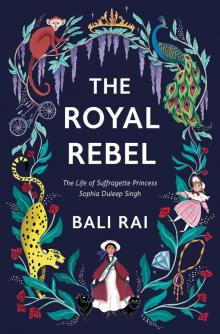 The Royal Rebel
The Royal Rebel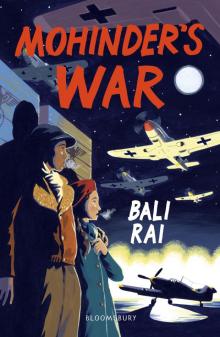 Mohinder's War
Mohinder's War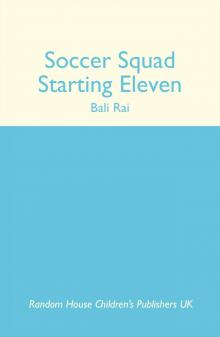 Starting Eleven
Starting Eleven Glory!
Glory! (Un)arranged Marriage
(Un)arranged Marriage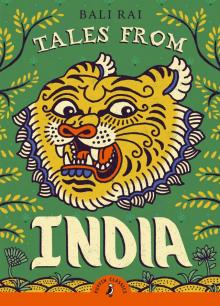 Tales from India
Tales from India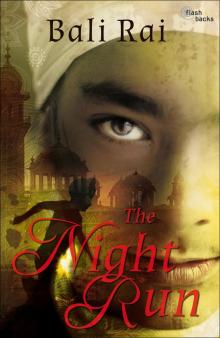 The Night Run
The Night Run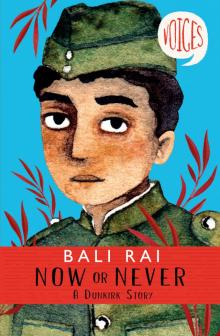 Voices: Now or Never
Voices: Now or Never Rani and Sukh
Rani and Sukh Stars!
Stars!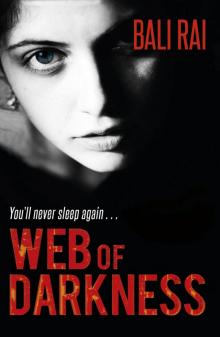 Web of Darkness
Web of Darkness The Crew
The Crew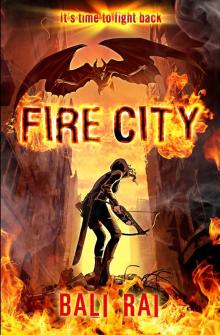 Fire City
Fire City The Last Taboo
The Last Taboo